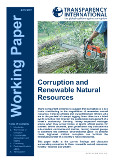Location
About
One global movement sharing one vision: a world in which government, business, civil society and the daily lives of people are free of corruption.
In 1993, a few individuals decided to take a stance against corruption and created Transparency International. Now present in more than 100 countries, the movement works relentlessly to stir the world’s collective conscience and bring about change. Much remains to be done to stop corruption, but much has also been achieved, including:
- the creation of international anti-corruption conventions
- the prosecution of corrupt leaders and seizures of their illicitly gained riches
- national elections won and lost on tackling corruption
- companies held accountable for their behaviour both at home and abroad
Mission
Our Mission is to stop corruption and promote transparency, accountability and integrity at all levels and across all sectors of society.
Vision
Our Vision is a world in which government, politics, business, civil society and the daily lives of people are free of corruption.
Values
- Transparency
- Accountability
- Integrity
- Solidarity
- Courage
- Justice
- Democracy
Programmes
For specific information about TI's work on land corruption, see here.
Resources
Displaying 41 - 45 of 46WORKING PAPER 01/2007: CORRUPTION AND RENEWABLE NATURAL RESOURCES
There is important evidence to suggest that corruption is a key factor contributing to the degradation of renewable natural resources. Forestry officials and law enforcement officers who are in the pockets of corrupt logging firms often turn a blind eye to activities that threaten the sustainable management of a forest’s biodiversity. Similarly, fishery inspectors endanger stocks when they accept bribes to ignore official quotas for trawlers.
WORKING PAPER 01/2007: CORRUPTION AND RENEWABLE NATURAL RESOURCES
There is important evidence to suggest that corruption is a key factor contributing to the degradation of renewable natural resources. Forestry officials and law enforcement officers who are in the pockets of corrupt logging firms often turn a blind eye to activities that threaten the sustainable management of a forest’s biodiversity. Similarly, fishery inspectors endanger stocks when they accept bribes to ignore official quotas for trawlers.
Adili Issue 40
Contains cleaning up the mess at Lands? – an exclusive interview with Hon. Amos Kimunya, Minister for Lands and Settlement; land: political patronage’s greatest weapon – an interview with Odenda Lumumba, National Coordinator, Kenya Land Alliance; corruption thriving in informal settlements – an interview with Jane Weru, Executive Director, Pamoja Trust; land: Kenya’s simmering powder keg by Odindo Opiata, Kituo cha Sheria; land rights for poor people key to poverty reduction, growth – World Bank (Policy Research Report).
Land & Corruption in Africa
General
Launched in 2014, the Land and Corruption in Africa Programme is addressing land corruption risks by: Sharing information on how land corruption manifests and what its effects are. Ensuring that land corruption and actions to fight it are put on the agendas of governments and international bodies like the African Union. Raising the importance of combating land corruption in the global land governance debate. Educating citizens about their land rights and how to defend them. Working with governments, traditional authorities, the private sector and civil society to find solutions to combat land corruption. Ensuring intergovernmental organisations, governments and business have procedures in place to sanction offenders and bring about justice for affected citizens. Pushing for solutions to land corruption that are responsive to the needs of women, young people and other marginalised citizens
Land: Enhancing Governance for Economic Development (LEGEND)
General
The project supports country offices to set up and implement new land programmes by funding programme scoping and design, and providing expert 3rd party advice during implementation; supporting a range of global level activities covering improved private sector land investment, land information and knowledge and land rights protection.





